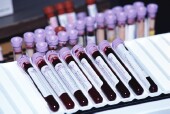| 
Study Links Serum Calcium, Prostate Cancer Death
 WEDNESDAY, Sept. 3 (HealthDay News) -- Men whose serum calcium levels fall within the high end of the normal range are three times more likely to develop fatal prostate cancer, a new report shows.
The results suggest the possibility of a new biomarker for aggressive prostate cancer, the researchers said. But one expert cautioned against reading too much into the study, given the relatively small number of individuals involved.
Gary Schwartz, of Wake Forest University Health Sciences in Winston-Salem, N.C., and Halcyon Skinner, of the University of Wisconsin, Madison, used data from the National Health and Nutrition Examination Survey (NHANES) and NHANES Epidemiologic Follow-up Study to determine the risk of prostate cancer among men with relatively high, but still normal, blood serum calcium readings.
Participants represented a random cross-section of American households, and they were first examined in the early 1970s. At that time, blood samples were drawn, and serum calcium levels obtained. The participants were then monitored for an average of almost 10 years. Skinner and Schwartz asked, in this population, was there any correlation between baseline serum calcium and risk of prostate cancer later in life?
"It would be the equivalent of a high school guidance counselor looking at SAT scores from students 20 years ago to see how [the scores] predict academic or business success," Schwartz explained.
In the study, 2,814 men between the ages of 24 and 77 at the time of their initial blood draw were included in the analysis, yielding 85 total cases and 25 fatal cases of prostate cancer over 46,188 person-years of follow-up.
When these cases were segregated according to the individuals' serum calcium levels, the authors found that those whose serum calcium readings during the initial blood draw fell at the highest-third of the normal range (between 9.9 mg/dL and 10.5 mg/dL) were about 2.7 times more likely to die of prostate cancer than those with readings in the lowest or middle thirds (between 9.0 mg/dL and 9.8 mg/dL).
That association held even adjusting for the most well-known prostate cancer risk factors -- age, weight, race and family history.
In contrast, no relationship was observed between serum calcium levels and "incident" prostate cancer -- that is, with the occurrence of new cases of prostate tumors in general.
The results were published in the September issue of Cancer Epidemiology, Biomarkers & Prevention, published by the American Association for Cancer Research.
Dr. Durado Brooks, director of prostate & colorectal cancer at the American Cancer Society in Atlanta, said, "There's been a lot of work around dietary calcium -- calcium supplements -- and prostate cancer risk, but I haven't seen much looking at serum calcium levels and prostate cancer risk, so I think it's an interesting angle to take on this issue."
Though he cautioned against "making too much about this," given the small number of affected individuals in the study, Brooks said the research should nevertheless "stimulate additional work in this area."
Serum calcium levels have almost nothing to do with dietary calcium intake, Schwartz emphasized. Serum calcium levels are tightly regulated and are characteristic of an individual in the same way as body temperature and height, he said. Thus, whether an individual eats a diet rich in cheese and milk or not, serum calcium levels generally do not vary by more than about 2 percent; instead, people are probably genetically predisposed to have one level or another, Schwartz explained.
The real "eye-opener," he said, is that, should the results be validated in other studies, serum calcium would represent one of the most significant known risk factors for prostate cancer, and the only one that could be clinically modified.
"The relative risk of prostate cancer for being black is about two, and the relative risk for having a positive family history is about 2.5. So a relative risk greater than 2.5 is actually bigger than anything we know," he said. "But what makes this really interesting is, if this is causal, it can be changed with medicine."
First, though, the results must be validated in other studies, Brooks noted. Researchers must then determine whether calcium itself actually causes this increased risk or is merely a marker of some other biological process. Either way, should the data be borne out, Brooks suggested another possible use of serum calcium.
Given that most cases of prostate cancer never become aggressive, "Maybe we could use those values to guide medical treatment, to decide who needs more aggressive therapy," he said. "It could be one factor in helping make a treatment decision."
More information
For more about prostate cancer, visit the National Cancer Institute.
|  |

'Bonding Gene' Could Help Men Stay Married

MONDAY, Sept. 1 (HealthDay News) -- Whether a man has one type of gene versus another could help decide whether he's good "husband material," a new study suggests.
A study of Swedish twin brothers found that differences in a gene modulating the hormone vasopressin were strongly tied to how well each man fared in marriage.
"Our main finding was an association between a variant of the vasopressin receptor 1a gene and how strong bonds men reported they had to their partners," said lead researcher Hasse Walum, of the department of medical epidemiology and biostatistics at the Karolinska Institute in Stockholm. "Men carrying this variant scored on average lower on a scale measuring the strength of the bond compared to men not carrying this variant."
Women married to men carrying the "poorer bonding" form of the gene also reported "lower scores on levels of marital quality than women married to men not carrying this variant," Walum noted.
His team published its findings in this week's issue of the Proceedings of the National Academies of Science.
Walum's team first got interested in the role of vasopressin and bonding among males when studying a rodent, the vole. "Studies in voles have shown that the hormone vasopressin is released in the brain of males during mating," Walum explained.
Vasopressin activates the brain's reward system, and "you could say that mating-induced vasopressin release motivates male voles to interact with females they have mated with," Walum said. "This is not a sexual motivation, but rather a sort of prolonged social motivation." In other words, the more vasopressin in the brain, the more male voles want to stick around and mingle with the female after copulation is through. This effect "is more pronounced in the monogamous voles," Walum noted.
But voles and humans are very different species, so would the same effect hold true for men?
To find out, the Swedish team zeroed in the vasopressin 1a gene, which is shared by both species. Variations in this gene strongly influence vasopressin activity in the male vole, so Walum wondered if it might do the same for men.
To find out, his team looked for variants of the vasopressin 1a gene among 552 pairs of male twins enrolled in Sweden's ongoing Twin and Offspring Study. All of the men were currently in a relationship that had lasted at least five years, although about 18 percent of the men remained unmarried. The men were subjected to psychological tests assessing their ability to bond and commit, and the researchers also interviewed the men's spouses when possible.
They found that men with a certain variant, known as an allele, of the vasopressin 1a gene, called 334, tended to score especially low on a standard psychological test called the Partner Bonding Scale. They were also less likely to be married than men carrying another form of the gene. And carrying two copies of the 334 allele doubled the odds that the men had undergone some sort of marital crisis (for example, the threat of divorce) over the past year.
All of these findings "make sense," said Dr. John Lucas, a clinical associate professor of psychiatry at Weill Cornell Medical College in New York City. He said it's well known that genes help drive much of human behavior, including mate bonding.
But the vasopressin 1a gene is likely not the only factor influencing a man's ability to form true and lasting bonds, he added.
"It's unlikely to be a single gene [at work] -- it's likely to be multiple genes that are expressed incompletely and interact with the environment," said Lucas, who is also a psychiatrist at New York Presbyterian Hospital/Weill Cornell Medical Center. He pointed out that what psychologists call "temperament" -- the individual palette of emotions and behaviors that even babies display -- is probably "hard-wired" by our genetics. "But temperament, through training and experience, becomes personality," Lucas said. "And personality is a complicated situation, of course, and it involves the ability to commit."
So, it's too early for men to blame their inability to commit on a single gene, although Lucas guesses it's an excuse that's "certainly going to be used."
For his part, Walum agreed that men and their spouses shouldn't read too much into the finding.
"Taken together, the effect of the gene variant that we have studied on human pair-bonding behavior is rather small, and it can not, with any real accuracy, be used to predict how someone will behave in a future relationship," he said.
Walum also noted that the finding would probably not be applicable to women, since vasopressin appears to be tied to social bonding in males, but not females.
In a related study, also in the same issue of the journal, researchers at the Pacific Health Research Institute in Honolulu said they've identified a gene strongly linked to extended health and life span in humans. The FOXO3A gene, involved in insulin signaling, is just the second gene ever found that is closely tied to longevity, the researchers said. In their study of Japanese-American men, those who lived to an average age of 98 had a specific variant of FOXO3A compared to men who died at younger ages, the team said.
More information
There's more on genes and behavior at Stanford University  . .
|  |
|